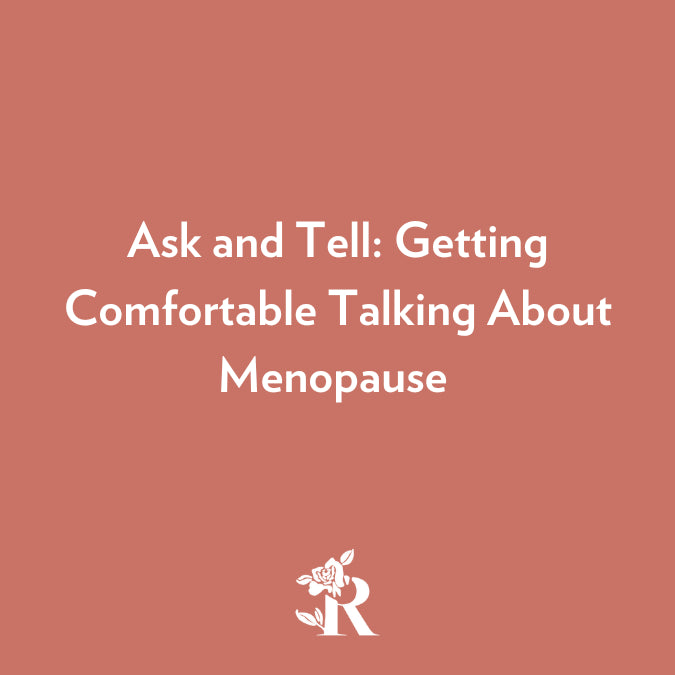Getting Comfortable Talking About Menopause: A Sample Script!
Navigating menopause can be a transformative and sometimes challenging experience for women. Here's a script that you can use as a starting point to help normalize conversations about menopause:
Introduction:
You: Hey [Friend/Colleague/Family Member], can we chat for a moment? I wanted to talk about something important and personal that I think needs more open conversation and understanding. Is that okay?
Friend/Colleague/Family Member: Of course! I'm here to listen. What's on your mind?
Normalizing Menopause:
You: Well, I wanted to talk about menopause. It's a natural phase of life that all women go through, but it often feels like it's shrouded in silence and misconception. I believe it's time to change that and start normalizing conversations around menopause.
Friend/Colleague/Family Member: I agree entirely! It's essential to break the silence and create a supportive environment. How can we help?
You: Start conversations, share experiences, and educate ourselves and others. Menopause brings about various physical and emotional changes that can impact women's lives. Normalizing the discussion can ensure that women going through this transition feel seen, understood, and supported.
Sharing Personal Experiences:
You: I'll start by sharing some of my own experiences with menopause. [Share personal experiences, such as symptoms you've encountered, challenges you've faced, or positive aspects you've discovered.] It's been a journey, and having open conversations with friends and family has made a tremendous difference in navigating this phase.
Friend/Colleague/Family Member: Thank you for sharing your experiences. It's eye-opening and helps me understand what you and other women may be going through.
Providing Information and Correcting Misconceptions:
You: I also wanted to address some common misconceptions about menopause. It's not just about hot flashes or mood swings; it's a complex and individual experience. Symptoms can vary significantly from woman to woman, and the impact on mental and emotional well-being shouldn't be underestimated.
Friend/Colleague/Family Member: That's good to know. I'll keep that in mind and share this information with others. It's important to challenge those misconceptions and promote accurate understanding.
Encouraging Openness and Support:
You: I hope we can all work together to create an environment where women feel comfortable talking about menopause without fear of judgment or embarrassment. It's about fostering empathy, providing support, and being willing to listen and learn.
Friend/Colleague/Family Member: Absolutely! Let's commit to being there for one another, lending a listening ear, and offering support during this important phase of life.
Closing:
You: Thank you for being open to this conversation and your support. By normalizing menopause and promoting understanding, we can help create a more inclusive and empathetic world for women going through this transformative journey.
Friend/Colleague/Family Member: You're welcome! I'm glad we had this conversation, and I'm here for you. Let's continue spreading awareness and working towards a more supportive environment for women experiencing menopause.
Remember, this script is just a starting point, and you can customize it based on your experiences and your relationship with the person you're speaking to.
The key is to initiate the conversation, share your experiences, provide information, and encourage empathy and support. To get more prepared for that, here are some suggestions:
- Educate Yourself: Start by educating yourself about menopause and its symptoms, including physical, emotional, and hormonal changes. Understanding what you're going through can help you articulate your experiences more confidently when discussing menopause with others.
- Seek Supportive Networks: Connect with other women who are going through or have experienced menopause. Join support groups, online communities, or forums where you can openly discuss your concerns, share experiences, and gain insights from others who can relate to what you're going through.
- Talk to Healthcare Professionals: Engage in open and honest conversations with your healthcare provider. Discuss your symptoms, concerns, and treatment options. A supportive and knowledgeable healthcare professional can provide guidance, answer your questions, and offer appropriate medical advice.
- Share with Trusted Friends and Family: Reach out to your close friends and family members you trust. Let them know about your experiences with menopause and the challenges you may be facing. Sharing your feelings and concerns can provide emotional support and understanding.
- Normalize the Conversation: Help break the stigma around menopause by openly discussing it. Share your experiences and encourage others to share theirs. Normalizing the conversation creates a safe space for open dialogue and reduces the sense of isolation that some women may feel.
- Use Clear and Empowering Language: When discussing menopause, choose language that empowers and accurately reflects your experiences. Using specific terms and clearly describing symptoms or situations can help others understand and empathize better. Avoiding euphemisms or minimizing your experiences can lead to misunderstandings.
- Be Prepared and Assertive: Before engaging in conversations about menopause, prepare yourself by gathering relevant information and facts. Anticipate questions or concerns that others may have and be ready with answers or resources. Be assertive in expressing your needs, whether seeking support, accommodation, or understanding from those around you.
- Educate Others: As you become more comfortable discussing menopause, consider educating others about it. Dispel myths, provide accurate information, and promote understanding. By raising awareness, you contribute to creating a more informed and supportive environment for women experiencing menopause.
Open conversations about menopause can help reduce the stigma, provide support, and promote overall well-being for women navigating this important life stage.













